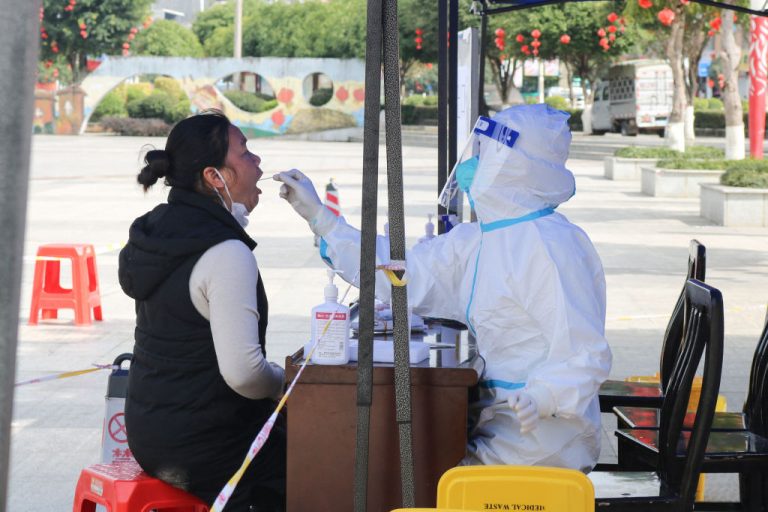On Monday, Feb. 7, the Chinese city of Baise, located close to the border between China and Vietnam, was placed under lockdown due to a rise in the number of new COVID-19 cases.
The lockdown came as both Asian countries are facing growing problems due to new outbreaks and with the highly contagious Omicron variant threatening to disrupt the ongoing Winter Olympics in Beijing.
City on lockdown
Located in the autonomous region of Guangxi Province, the city of Baise, home to around 3.5 million people, has reported a total of 180 “domestically transmitted” cases of COVID-19 as of Tuesday, Pang Jun, deputy director of the regional health commission, told reporters.
Among the confirmed cases, two people have been reported to be infected with the Omicron variant.
READ MORE:
Success
You are now signed up for our newsletter
Success
Check your email to complete sign up
He Qinghua, an official for China’s National Health Commission, said the current outbreak in Baise was in the “fast rising phase,” sharing concerns that it could spread to other cities. He also deduced that the outbreak stems from the transparency of the transmission, as well as increasing movement from the public during the Lunar New Year at the beginning of this month.
“About 80 percent of the infected people in this outbreak live in the same natural village and share the same space,” He said.
Under the new lockdown rules, city officials declared a day earlier that all residents are required to remain in the city, with an exception for mass testing. Strict traffic controls and enforcements were also enacted to ensure that “no unnecessary movement of people” is allowed, vice-mayor Gu Junyan said.
In certain districts, residents are even confined to their homes, while others were told they would not be allowed to leave the district, Gu added. Schools and business venues — except for supermarkets and grocery stores — will remain closed, while public transport has been halted.
Workers who are considered “essential”, including food deliverers and those involved in control and medical services, will be allowed to navigate through Baise with government issued permits.
He Qinghua emphasized the priority of locating and controlling individuals who are likely to be infected, as well as the increased effort of testing in infection-prone areas to quell the outbreak.
Businesses suffering
After the lockdown was announced, several businesses reported an increasing strain in productivity and income as the government’s “Zero-COVID” policy continues to disrupt China’s economy.
READ MORE:
- In 2022, Expect China’s Economy to Worsen Further
- Shenzhen Civil Servants’ Pay Slashed as Chinese Government Sees Fiscal Shortages
A tourist guide in the Guangxi region shared his concerns in regards to his income and the future of tourism as a whole after being advised not to guide travelers at this time.
“My income is basically zero at this moment,” the guide, surnamed Luo, told Reuters.
A hotel front desk agent working Baise, surnamed Li, also said, “Because of the outbreak, our hotel’s projected occupancy rate (this year) may not be as high as expected.”
Neighboring cities have also been alerted of the most recent outbreak, implementing new measures to curb the virus. The city of Heichi, west of Baise, has been placed under a 24-hour watch with law enforcement officers and medical staff keeping an eye around the premises.
The city of Nanning also announced on Feb. 9 that anyone coming from Baise is to be isolated at home immediately, and are not allowed to venture into public areas.
With China as the biggest producer of aluminum, the outbreak in Baise — where the resource is abundant — is likely to disrupt the country’s ability to keep up demand and ship out supplies of aluminum.
A restaurant chain has also ceased operations at “two of its three outlets” and staffers are required to do a “nucleic acid test every day,” one worker of the chain said.
COVID-19 strikes back in Southeast Asia
While authorities in China scramble to extinguish the new outbreaks, Vietnam, among other Southeast Asian countries, saw a significant spike of cases in the past few days. As of Wednesday, several warnings have been made regarding the country’s hospital system going into overdrive.
Vietnam was hit with around 24,000 new cases on Feb. 9, as opposed to the 15,000 per day one week before the annual holiday. Domestic airlines were also packed with extra night flights at the same time, another government statement said.
“Increased traveling will lead to the risk of more infections among the community, including the risk of spreading the Omicron variant,” Vietnam’s health ministry said in a statement.
“If not better controlled, the number of serious cases will increase, putting pressure on the healthcare system and causing unwanted deaths.”
As a whole, Vietnam has accumulated a total of 2.4 million infections from the pandemic, with more than 38,000 deaths. Out of the 98 million people in the country, three quarters of it have been vaccinated.
Alina Wang contributed to this report.














